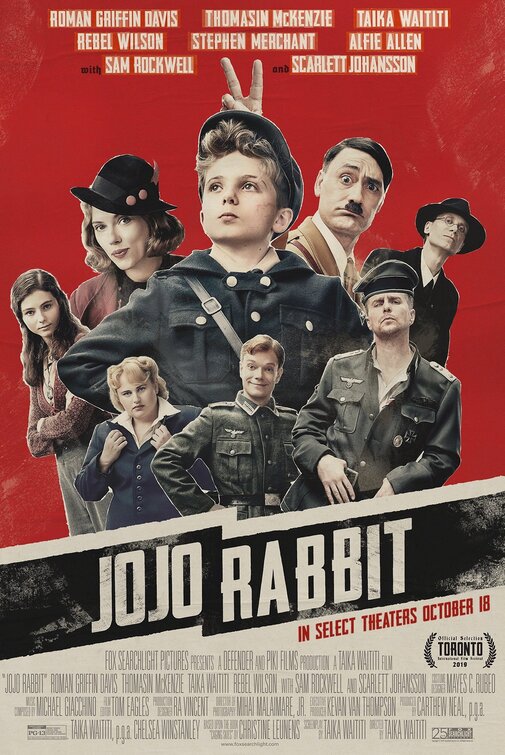An Anti-Hate Satire
Director
Taika Waititi
Starring
Roman Griffin Davis
Thomasin McKenzie
Scarlett Johansson
Sam Rockwell
Set in Nazi Germany during the last days of World War 2, we are introduced to the ten year old Johannes Betzler [Griffin Davis], affectionately dubbed Jojo. He is an extremely enthusiastic supporter of the Third Reich but being only ten years old, does what he can for the Hitler Youth with the intent of being promoted to Hitler’s personal guard. This feverish devotion is heightened by the fact that he has an imaginary friend in the form of a whimsically silly and childish Adolf Hitler [Waititi]. After being picked on during a retreat, Jojo attempts to prove his machismo by snatching a grenade and flinging it deep into the woods. This backfires, literally, and Jojo is left scarred and confined to his house with only his mother, Rosie [Johansson] for company. Jojo’s life is further disrupted when he meets Elsa [McKenzie], a young Jewish girl being hidden in the walls of his sister’s bedroom. Conflicted, Jojo and his imaginary Hitler decide the best course of action would be to interrogate the stranger and write a book all about Jews, which he can then present to the fuhrer to curry his favour.
Falling on the wrong side of history is often a mark of eternal regret, shaping a nation’s identity for decades to come but when a child is indoctrinated to follow suit, it’s utterly heart-breaking. Such is the tricky line that Jojo Rabbit walks. The tone of this movie is perfectly set within the first few minutes, from the Beatles/Hitler cult of personality juxtaposition to the irreverent goofiness of fake Hitler’s supportive comments, Jojo Rabbit wastes no time setting out what kind of movie this will be; a delightfully whimsical and charming story with an undercurrent of forlorn sorrow. Owing to its simple approach, this film is also as much a journey of shame and forgiveness as it is a standard coming of age dramatic comedy. But unlike Waititi’s other whimsical coming-of-age releases – Boy and Hunt For The Wilderpeople – Jojo Rabbit is more stylised in its execution, akin to an early Wes Anderson film, with its quirky cinematography and Giacchino’s score.
Part of the reason this film is such an easy sell is the calibre of acting on display. Griffin Davis and McKenzie carry the narrative magnificently, juggling light-hearted playfulness with sombre undertones of hardship. While it would be easy to descend into a cutesy portrayal, the script and performances allow for some genuine moments of immaturity and childlike self-centredness. A prime example would be the Nathan letters. After meeting Elsa, Jojo learns that she was proposed to by her boyfriend, Nathan, before he fled to join the resistance. In a moment of (admittedly conflicted) jealousy, Jojo pens a letter from Nathan that he claims to have found, the contents of which are actually remarkably cruel but when he realises how hurtful his actions have been, he starts to pen new letters apologising for being mean but maintaining that Nathan is still a bad person – in a hopeless attempt to protect his ego and elevate his own potential standing in Elsa’s eyes. They are simple interactions but afford the leads the chance to cement themselves in the audience’s favour and illustrate that despite the rhetoric that Jojo spouts, he is still a sweet innocent boy underneath it all. Having said all that, the film never manages to pack enough of a punch when compared to something like The Boy In The Striped Pyjamas, to the film’s detriment.
The adult actors carry this heightened sense of absurdity with two in particular standing out. The first is the fatigued, disenfranchised Captain Klenzendorf [Rockwell], who is aware the war is coming to an end and that his side will likely lose. In a parallel with his character in Three Billboards Outside Ebbing Missouri, throughout the story we are given the growing impression that, despite being a decorated Nazi officer, Klenzendorf is a decent human being who doesn’t believe in the cause; a roll which Rockwell is magnificently suited for. Then we have the manifestation of Jojo’s internal turmoil and conflict against ideologies, Waititi’s Hitler. At times childlike and mischievous while others erratic and intimidating, Waititi’s character is the very embodiment of a bully who calls himself a friend. In that way, it’s a great performance but we will come back to the problem with clowning an individual like Adolf Hitler. I also have two more characters to highlight but they too are respectively covered later in the highlighted character and scene sections below.
Walking away from this movie, I was imbued with a sense of warmth from this heartfelt tale. The emotional journey is endearing while the message is clear but the more I think back on it, the more this initial reaction tempers. Ultimately this film is surprisingly straightforward, predictable and blunt in its execution and while it is incredibly honest it doesn’t say anything new. Naturally, it would be nice to think “Nazis are bad” is the most rote thing one could say but the state of affairs in this day and age means victories are not won outright and this kind of on-the-nose satire could genuinely be quite helpful… were it not for the fact that all the villains are remarkably stupid and silly. Robbing such a violent and horrific regime of their prestige weakens them – as seen in something like The Producers but it also illustrates them in an amusing light and perpetuates the dangerous concept that intolerance will only ever arrive in an elaborate costume with a funny voice. Thankfully there are some tense moments that attempt to dismiss this but to maintain the overall comedic tone, these are few and far between. Having said that, sometimes intolerance is so widespread that you need a blunt instrument to break through the rhetoric.
Is Jojo Rabbit going to alter the way you look at the world? Very likely not. It is a fun, light film whose heart is in the right place? Almost certainly. And sometimes, that’s all a movie needs to be to get an important message across.
Release Date:
03 January 2020
The Scene To Look Out For:
**spoilers**
Scarlett Johansson performs magnificently as Rosie from start to finish. Playful, supportive and loving, she quickly endears the audience to her as an almost impossibly perfect mother and all-round good person. I was particularly impressed when Jojo demands to see his (presumably dead) father and Rosie storms off to grab his jacket, wipes soot across her face to make a faux-beard and berates her son for talking to his mother in such a way. It’s creative, simple and taps into the frustrations that she cannot really share with her child. I also really enjoyed the shoe-based signposting, for the tragedy that takes place in the third act, dotted throughout the movie.
Notable Characters:
Stephen Merchant is a wonderfully ridiculous individual. He is an obvious choice for comedic roles but it is when he is given the opportunity to be more human or menacing that he truly stands out. And although his appearance is brief, I think being a both menacing and hilarious gestapo agent strikes the perfect tone for this release, in the same way that he stood out as a stellar choice for things like Logan and Portal 2.
Highlighted Quote:
“We were chosen by God! You were chosen by a weak little man who can’t even grow a full moustache!”
In A Few Words:
“A sweet and earnest, if somewhat simple, feature with its heart in the right place”
Total Score: 4/5
![The Red Right Hand Movie Reviews [Matthew Stogdon]](https://reviews.theredrighthand.co.uk/wp-content/uploads/2021/12/cropped-header1.png)




